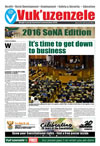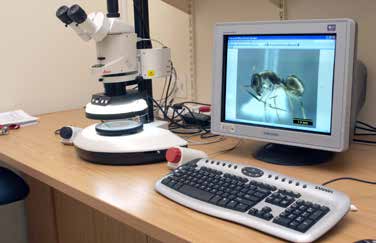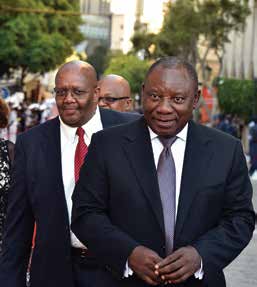March 2016 SoNA Special Edition
March 2016 SoNA Special Edition Estelle GreeffIt’s time to get down to business
It’s time to get down to business andileState of the Nation Address
When President Jacob Zuma took to the podium to deliver his State of the Nation Address recently, he did not only paint a picture of the reality that our country faces, but he also offered South Africans some solutions.
A united South Africa, in which all sectors working together for the good of the nation, is what is required for the country to rise above the tough economic conditions and other challenges it is currently facing.
This is the message President Jacob Zuma had for South Africans. The President emphasised that getting down to the business of pursuing an economic turnaround was not only governement’s responsibility but a shared responsibility between members of the business sector, labour and citizens.
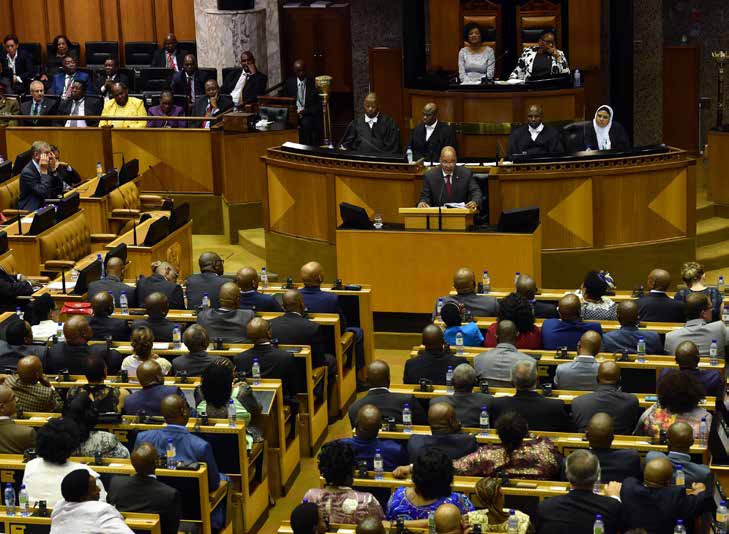
Economy a victim of global financial climate
Speaking on the importance of a healthy economy, the President said a resilient and fast-growing economy was at the heart of South Africa’s radical economic transformation agenda and the National Development Plan (NDP).
“When the economy grows fast it delivers jobs. Workers earn wages and businesses make profits. The tax base expands and allows government to increase the social wage and provide education, health, social grants, housing and free basic services faster and in a more sustainable manner,” said President Zuma.
The President said the economy had faced difficulties since the 2008 global financial crisis and although South Africa embarked on an aggressive infrastructure development programme to stimulate growth, the country was affected by the international economic climate.
“Global growth still remains muted. Financial markets have become volatile. Currencies of emerging markets have become weak and they fluctuate widely. The prices of gold, platinum, coal and other minerals that we sell to the rest of the world have dropped significantly and continue to be low,” he said.
He noted that the economies of two of South Africa’s BRICS partners, Brazil and Russia, were expected to contract and that China’s economy would not grow as strongly as normal. “Because our economy is relatively small and open it is affected by all these developments,” explained the President.
These developments and domestic challenges such as electricity constraints and sometimes unstable industrial relations affected the local economy, which the International Monetary Fund and World Bank predict will grow by less than one per cent this year. This suggests lower than expected revenue collection.
There was also the risk of ratings agencies downgrading South Africa’s investment status. If this happens it would affect everyone. “It will become more expensive for us to borrow money from abroad to finance our programmes of building a better life for all, especially the poor,” cautioned the President. It is against this stark economic picture that President said the situation required an effective turnaround plan comprising various responses.
Spending Wisely
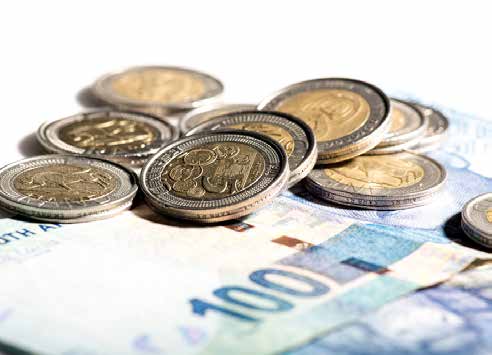 “A big expenditure item that we would like to persuade Parliament to consider is the maintenance of two capitals, Pretoria as the administrative one and Cape Town as the legislative capital,” noted the President. Currently Cape Town is the seat of Parliament and Parliament is the administrative capital. He pointed out that having two capitals entailed duplicate expenses on such things as accommodation and transportation, among others. Government had undertaken to spend public funds wisely and cut wasteful expenditure without “compromising on the core business of government and the provision of services,” said President Zuma.
“A big expenditure item that we would like to persuade Parliament to consider is the maintenance of two capitals, Pretoria as the administrative one and Cape Town as the legislative capital,” noted the President. Currently Cape Town is the seat of Parliament and Parliament is the administrative capital. He pointed out that having two capitals entailed duplicate expenses on such things as accommodation and transportation, among others. Government had undertaken to spend public funds wisely and cut wasteful expenditure without “compromising on the core business of government and the provision of services,” said President Zuma.
The cost-containment measures the Minister of Finance announced in 2013 decreased excessive and wasteful spending by government, but more steps would be taken to cut wastage. The President said overseas trips would be shortened, strong motivations for trips abroad would be required and the sizes of delegations would be cut down and standardised. There would also be further restrictions on conferences, catering, entertainment and social functions.
Government departments would no longer host budget vote dinners for stakeholders after the delivery of budget speeches in Parliament. The executive management and boards of public agencies and state-owned companies (SOCs), as well as the Premiers of the provinces and Mayors were expected to join national government in eliminating wasteful expenditure.
The President said although the country is faced with challenges, the positive attributes outweighed the challenges. This meant South Africa remained an attractive investment destination. “We must continue to market the country as a preferred destination for investments. This requires a common narrative from all of us as business, labour and government.”
Important anniversaries 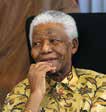
President Jacob Zuma deliverd his 2016 State of the Nation Address on the 26th anniversary of the release of President Nelson Mandela from prison. Several other important anniversaries will be marked in 2016, including:
- Twenty years ago President Nelson Mandela signed into the law the Constitution at Sharpeville.
- Thirty years ago the Gugulethu Seven, an anti-apartheid group, were ambushed and killed by the police in Cape Town.
- This year marks 40 years since the June 16 youth uprising in Soweto.
- Fifty years ago the government of the day declared District Six in Cape Town a whites-only area. As a result over 60 000 residents were forcefully removed to the Cape Flats.
- Sixty years ago on 9 August 1956 – 20 000 women marched to the Union Buildings to protest the pass laws. Women from as far away as Port Elizabeth and Cape Town participated.
- On 20 May the centenary of the University of Fort Hare in the Eastern Cape, described by President Zuma as a critical milestone in the liberation history of South Africa and Africa, will be celebrated.
- A memorial marking the dignity and humanity of scores of black soldiers who fought in the Battle of Delville Wood - a series of engagements in the 1916 Battle of the Somme - in France, in the First World War, will be unveiled in France in July.
Matters of business
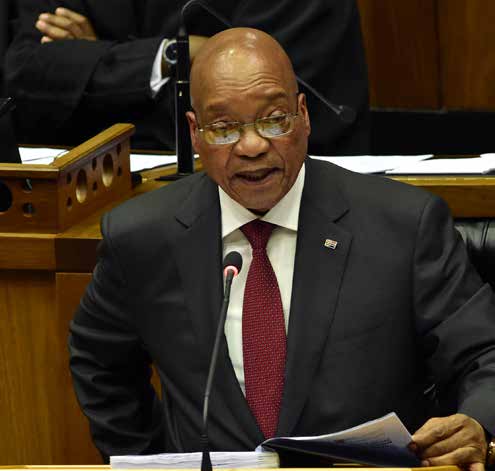 Just before the State of the Nation Address, President Zuma held a meeting between chief executive officers and others from the business community. Here it was decided that South Africa needed to have the correct investment support infrastructure.
Just before the State of the Nation Address, President Zuma held a meeting between chief executive officers and others from the business community. Here it was decided that South Africa needed to have the correct investment support infrastructure.
The President announced that a positive and encouraging outcome of government’s discussions with business would be the launch of a project by the country’s banks– through the Banking Association of South Africa - aimed at establishing a centre of excellence for financial services and leadership training. This would ensure that the country could attract, nurture, develop and retain the best talent in financial services.
Government was also developing a “One-Stop Shop/Invest SA” initiative to indicate that South Africa was “truly open for business”. The President said government would speed-up this initiative’s implementation together with the private sector and would help by removing red tape and reviewing legislative and regulatory obstacles.
“Economic transformation and black empowerment remained an essential part of all of government’s economic programmes,” he added. To increase the success rate and growth of new ventures embarked on by small, medium and micro enterprises high quality, innovative support was necessary. The Department of Small Business Development was established for this reason. Another intervention was the Black Industrialists Scheme which was launched to “promote the participation of black entrepreneurs in manufacturing”, said the President. Big business was encouraged to work with the new manufacturers including businesses owned by women and the youth to help broaden ownership and control of the economy.
The country also had to take advantage of the exchange rate and recent changes to visa regulations to grow inbound tourism. In addition, domestic tourism had to grow. “SA Tourism will invest R100 million a year to promote domestic tourism, encouraging South African to tour their country,” the President announced.
Peacekeepers
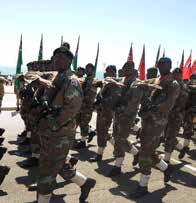 In celebration of Armed Forces Day on 21 February 2016 the South African National Defence Force demonstrated its capability in Port Elizabeth from 13 to 21 February. The South African Navy hosted the event.
In celebration of Armed Forces Day on 21 February 2016 the South African National Defence Force demonstrated its capability in Port Elizabeth from 13 to 21 February. The South African Navy hosted the event.
Armed Forces Day coincides with the commemoration of the sinking of the SS Mendi within 20 minutes on 21 February 1917 during the First World War. Of the 647 soldiers who died, 616 were South Africans.
DID YOU KNOW? National Development Plan (NDP)
The NDP is government’s longterm plan to eliminate poverty,reduce inequality and ensure South Africans enjoy a decent standard of living by 2030.
People with a decent standard of living have things such as housing, water, electricity and sanitation; quality health care; social protection; employment; and quality education and skills development present on this occasion.
THE YEAR THAT WAS
Reflecting on 2015, President Zuma reminded the nation that in February 2015 he had announced the Nine-Point Plan in response to slow growth. He reported that there had been significant progress in implementing the plan and in stabilising the country’s electricity supply, with the country experiencing no load shedding since August 2015. This has been a relief to households and industry.
State-owned companies
While concerns have been raised about the performance of state-owned entities and (SOCs), President Zuma pointed out that many SOCs were performing well. Sanral had built some of the best roads in Gauteng and in other parts of the country and Transnet had built rail infrastructure that allowed the country’s mines to transport commodities through South Africa’s ports to markets worldwide.
“Our development finance institutions such as the Industrial Development Corporation (IDC) or Development Bank of Southern Africa and others have provided finance for infrastructure, various industries and agricultural businesses without fail, even in the aftermath of the global financial crisis, said the President. SOCs had to be financially sound, properly owned and managed if they were to contribute to the successful implementation of the NDP.
“We will ensure the implementation of the recommendations for the Presidential Review Commission on State Owned Enterprises which outlines how the institutions should be managed,” the President promised. The task of ensuring that the recommendations were implemented fell to the Inter-Ministerial Committee chaired by the Deputy President, Cyril Ramaphosa.
"SOCs that were no longer relevant to South Africa’s development agenda would be phased out," President said.
Uniting to overcome challenges
Citizens must set aside racism and pursue social cohesion - diverse people joining hands and standing together in solidarity as members of one nation - so that they could be united in their response to the challenges that face South Africa, said President Zuma.
“If there are any disagreements or problems between us we should solve them before they escalate. This is necessary for the common good of our country,” he stressed. In an effort to confront racism, 21 March 2016, Human Rights Day, would be used to lay the foundation for a long-term programme for building a non-racial society, said the President.
Agriculture and land reform
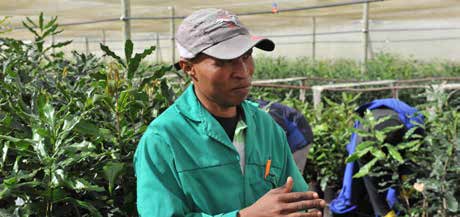 With regard to revitalising agriculture, the President said that construction had begun on at least five Agri-parks, namely Westrand in Gauteng, Springbokpan in North West, Witzenberg in the Western Cape, Ncora in the Eastern Cape and Ekangala in Mpumalanga. The Agri-parks programme that was introduced in 2015 is aimed at increasing smallholder farmers’ participation in agricultural activities.
With regard to revitalising agriculture, the President said that construction had begun on at least five Agri-parks, namely Westrand in Gauteng, Springbokpan in North West, Witzenberg in the Western Cape, Ncora in the Eastern Cape and Ekangala in Mpumalanga. The Agri-parks programme that was introduced in 2015 is aimed at increasing smallholder farmers’ participation in agricultural activities.
In 2015 President Zuma spoke about the 50/50 policy framework that proposed relative rights for people who work on farms. In response, 27 proposals had been submitted, of which four were being implemented in the Eastern Cape and Free State.
The President also said the draft Regulation of Land Holdings Bill would be presented to Cabinet in the first semester of 2016. The Bill would place a ceiling on land ownership at a maximum of 12 000 hectares and would prohibit foreign nationals from owning land.
They would however be eligible for long-term leases. In 2015 the re-opening of land claims for people who had missed the 1998 deadline was also announced. The President said that by December last year close on 120 000 land claims had been lodged.
Energy
The President announced that government had invested R83 billion in Eskom. This made it possible for the entity to continue investing in the Medupi (in Limpopo) and Kusile (in Mpumalanga) power plants while sustaining a diligent maintenance programme. Additional units from Ingula power station (on the border of Free State and KwaZulu-Natal) would be connected in 2017, with some synchronisation expected to start in 2016. President Zuma said the multiple bid windows of the Renewable Independent Power Producer Programme attracted a R194 billion investment.
“This initiative is a concrete example of how government can partner with the private sector to provide practical solutions to an immediate challenge.” The President announced that in 2016 government would select the preferred bidders for the coal independent power producer and that requests for proposals would also be issued for the first windows of gas-to-power bids.
The nuclear energy expansion programme remained part of the future energy mix with the plan being to introduce 9 600 megawatts of nuclear energy in the next decade in addition to running the Koeberg Nuclear Power Plan in the Western Cape.
Government would test the market to determine the true cost of building modern nuclear plants, emphasising that South Africa would “only procure nuclear on a scale and pace that our country can afford,” he added.
DID YOU KNOW? Chinese investment
South Africa took part in the India-Africa Summit and also the Forum on Cooperation between Africa and China. China had announced investments of US$50 billion of which South Africa would get $10 billion for infra-
Manufacturing
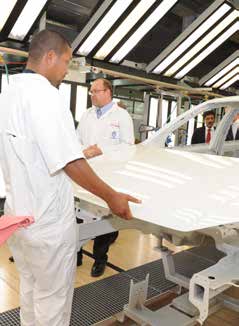 The Department of Trade and Industry introduced various successful incentives in recent years to stimulate investment in the manufacturing sectors, especially the textile, leather and automotive segments.
The Department of Trade and Industry introduced various successful incentives in recent years to stimulate investment in the manufacturing sectors, especially the textile, leather and automotive segments.
The incentives for the automotive sector attracted investments of over R25 billion over the last five years. “We welcome key investments from Mercedes, General Motors, Ford, Beijing Auto Works, the Metair group, BMW, Goodyear and VW,” said President Zuma, adding that the clothing and textile sector had also been stabilised after a few difficult years.
He added that “multinational companies such as Nestlé, Unilever, Samsung and Hisense have also affirmed South Africa as a regional manufacturing hub. They have retained and expanded their investments in new plants. Indeed the progress made in manufacturing has certainly demonstrated that the incentive programmes are effective and attractive to investors.”
Human Rights Day
Human Rights Day is commemorated on 21 March to remind South Africans of the sacrifices made in pursuit of democracy in South Africa such as the Sharpeville Massacre. On 21 March 1960 people from Langa and Sharpeville marched in protest against the pass laws. The police shot and killed 69 protesters in Sharpeville.
This year’s Human Rights Day on 21 March will be commemorated as the ‘National Day against Racism’ and laying the foundation for a long-term programme of building a non-racial society.
Water
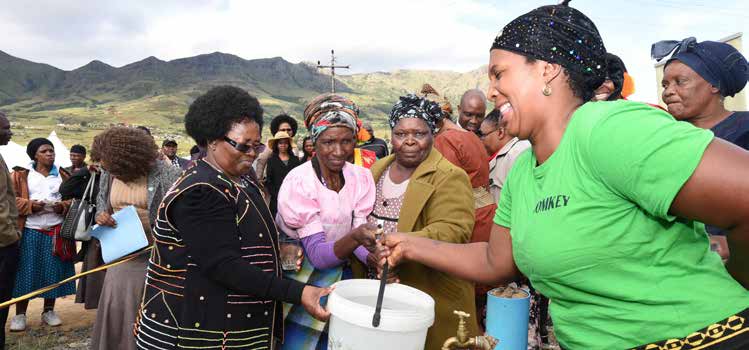 He noted that both government and civil initiatives such as Operation Hydrate were responding to communities affected by the drought in Free State, KwaZulu-Natal, Limpopo, Mpumalanga and North West. To curb water wastage, the Department of Water and Sanitation had begun its programme of training 15 000 young people as artisans.
He noted that both government and civil initiatives such as Operation Hydrate were responding to communities affected by the drought in Free State, KwaZulu-Natal, Limpopo, Mpumalanga and North West. To curb water wastage, the Department of Water and Sanitation had begun its programme of training 15 000 young people as artisans.
To increase access to water the construction of water infrastructure remained critical said the President, announcing that the first phase of the Mokolo and Crocodile Augmentation project in the Lephalale area in Limpopo was now fully operational and able to provide 30 million cubic metres of water a year to various users.
Ingula Hydro Power Station
Eskom and CMC Impregilo Mavundla Joint Venture are building a hydropower project called Ingula on the border of KwaZulu-Natal and Free State. Hydropower is electricity generated using the energy of moving water.
The Ingula Pumped Storage Scheme has an upper and lower dam about 4.6 km apart. Each dam can hold about 22 cubic metres of water. According to Eskom, they are connected by underground waterways passing through a subterranean powerhouse with four 333 MW generators.
To generate electricity during times of peak demand, water is released from the upper dam, passing through the pump/turbines, into the lower dam. During times of low demand, the pump/turbines are used to pump the water from the lower dam, back to the upper dam.
Labour, social security and mining
The President welcomed the agreement reached by social partners at the National Economic Development and Labour Council (Nedlac) on national minimum wage. “It is important to emphasise that the national minimum wage should be implemented in a manner that does not undermine employment creation, the thriving of small businesses or sustained economic growth.
“We are also encouraged by reports from Nedlac that a framework to stabilise the labour market by reducing the length of strikes and eliminating violence during strike action is being finalised,” said President Zuma. He added that within government there were ongoing talks led by the Department of Social Development and National Treasury about finalising the comprehensive social security policy.
The President noted that progress had been made in the mining sector and that stakeholders in the mining industry had signed the Leaders’ Declaration to Save Jobs. President Zuma urged parties to implement the agreement and continue finding ways of saving jobs, and appealed to business not to make retrenchments the first response when facing difficulty.
DID YOU KNOW? Science and Technology
As part of the ongoing promotion of innovation within the Nine-point Plan the Department of Science and Technology would finalise the Sovereign Innovation Fund. This public-private funding partnership is aimed at commercialising innovations.
The President explained that government would speed-up the implementation of the first phase of broadband roll out to connect over 5 000 government facilities in eight district municipalities over three years. Some R740 million had been allocated for this.
Social sector progress
President Zuma also noted that a lot of work had been done in the social sector in the past year. “Government has responded to the financial shortfall arising from the zero per cent university fee increase, as agreed in meeting with students and vice-chancellors last year.”
The Minister of Finance was expected to provide the details of education shortfall funding in the Budget speech. The President also appointed a Judicial Commission of Inquiry into higher education.
On the health front, the President noted that the life expectancy of South Africans for both males and females had significantly improved and is currently 62 years across genders, which is an increase of eight and a half years since 2005.
“The HIV policy turnaround in 2009 led to a massive rollout of HIV testing and treatment for 3.2 million people living with the virus. This has contributed immensely to healthier and longer lives for those infected.”
The next step, he said, was to revive prevention campaigns, especially amongst the youth. The Minister of Health was expected to announce a major campaign in this regard. President Zuma also announced that the state-owned pharmaceutical company, Ketlaphela, has been established. “The company will participate in the supply of anti-retroviral drug to the Department of Health from the 2016/17 financial year,” he added.
DID YOU KNOW? The Nine-Point Plan
During his State of the Nation Address in February 2015, President Jacob Zuma, among other things, announced the Nine-Point Plan to grow the economy and create much-needed jobs.
The plan consists of:
- Revitalising the agriculture and agro-processing value-chain
- Advancing beneficiation adding value to our mineral wealth
- More effective implementation of a higher impact Industrial Policy Action Plan
- Unlocking the potential of SMME, co-operativess, township and rural enterprises
- Resolving the energy challenge
- Stabilising the labour market
- Scaling-up private-sector investment
- Growing the Ocean Economy
- Cross-cutting Areas to Reform, Boost and Diversify the Economy;
- Science, technology and innovation
- Water and sanitation
- Transport infrastructure
- Broadband rollout
- State owned companies.
Making a difference
President Zuma acknowledged that, given the prevailing global economic climate, it was clear that the country would not achieve its growth target of five per cent a year by 2019 as envisaged by the NDP. “The tough global and domestic conditions should propel us to redouble our efforts, working together as all sectors. In this regard it is important to act decisively to remove domestic constraints to growth,” urged the President.
DID YOU KNOW? Black Industrialists Scheme
The Black Industrialists Scheme is an initiative of the Department of Trade and Industry. It aims to support majority black-owned manufacturing companies. The support includes access to finance, markets, skills development, and standards, quality and productivity improvement.
The Scheme offers a cost-sharing grant ranging from 30 to 50 per cent to approved entities to a maximum of R50 million. Support is aimed at manufacturing companies in the following sectors:
- Blue/Ocean economy, including vessel building and repair
- Oil and Gas
- Clean Technology and Energy
- Mineral Beneficiation
- Aerospace, rail and Automotive Components
- Industrial Infrastructure
- Information Communication Technologies
- Agro-Processing
- Clothing, Textiles /Leather and Footwear
- Pulp, Paper and Furniture
- Chemicals, Pharmaceuticals and Plastics
- Nuclear
- Manufacturing related logistics
- Designated Sectors for localisation
SoNA Pictorials
SoNA Pictorials JoyPresident Jacob Zuma delivered the State of the Nation Address (SoNA) to a joint sitting of Parliament on 11 February 2016 in what was a colourful and glamorous affair. During his speech, the President talked about government’s achievements of the past year and looked to the future by presenting a programme for the coming year. Vuk'uzenzele captured all the highlights of the SoNA, including all the glitz of the red carpet.
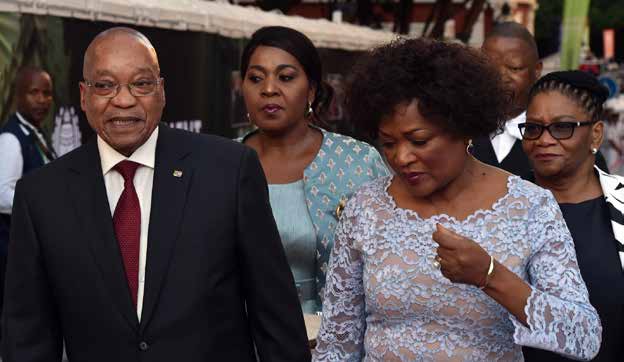
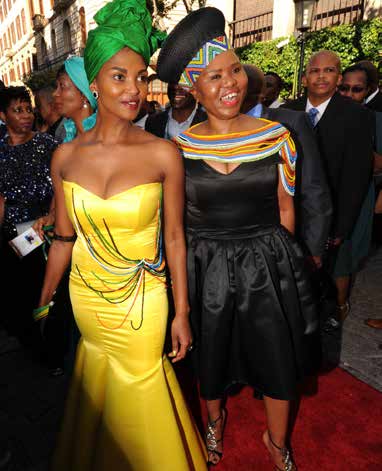
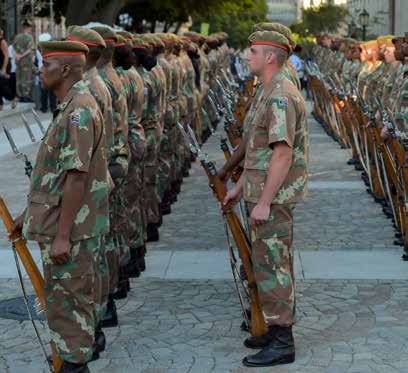
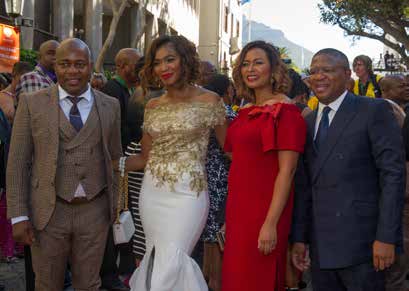
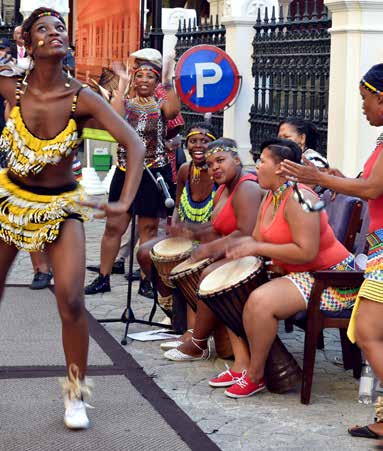
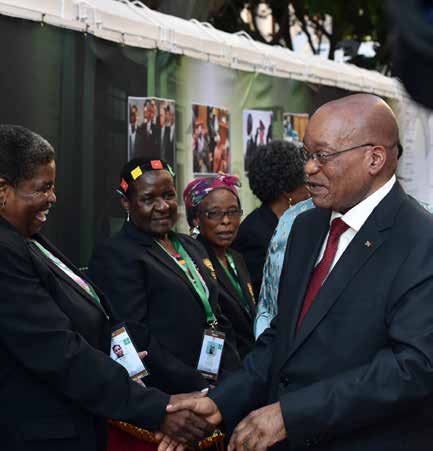
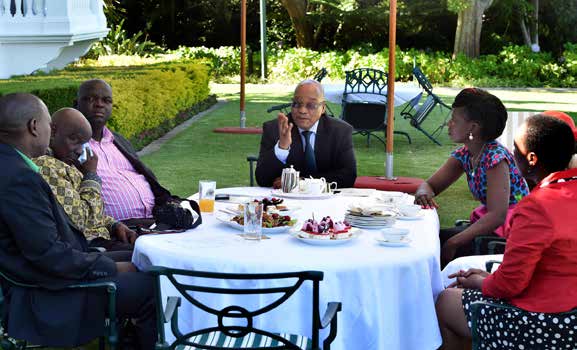
SoNA-in-Numbers
SoNA-in-Numbers Joy
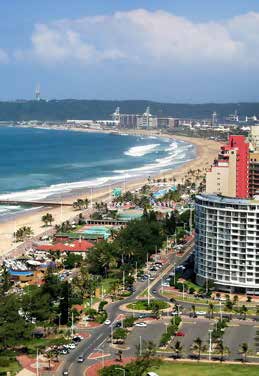 Economy
Economy
R100 million – to be invested a year by South African Tourism to promote domestic tourism.
- 10th – South Africa’s ranking in the World Economic Forum competitiveness report.
- US$50 billion – investments announced by China.
- US$10 billion – investment from China to South Africa for infrastructure, industrialisation and skills development.
- 5% – the annual growth target set in the National Development Plan to be achieved by 2019.
- R25 billion – investments attracted by incentives for the automotive sector over the last five years.
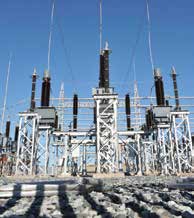 Energy
Energy
- R83 billion – government’s investment in Eskom.
- R194 billion – an investment attracted by the Renewable Independent Power Producer Programme.
- 9 600 – megawatts of energy to be introduced in the next decade.
Broadband roll-out
- 5 000 – government facilities in eight district municipalities to benefit from broadband roll-out.
- R740 million – funding for a broadband roll-out allocated over a three-year period to connect more than 5 000 government facilities in eight district municipalities.
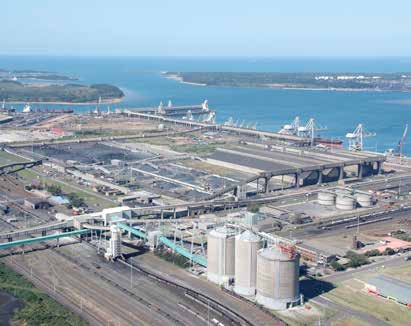 Oceans economy
Oceans economy
- R7 billion – money committed in new port facilities by the Transnet National Ports Authority.
- 3 000 – kilometres of coastline surrounding South Africa.
- R660 million – investment brought by a fuel storage facility in Cape Town.
- R350 000 – investment being committed in the aquaculture sector.
- 9 – aquaculture farms already in production in the Eastern Cape, KwaZulu-Natal, Western Cape and Northern Cape.
Safety and security
- 57 – the number of police officers murdered to date during the 2015/16 financial year.
Employment
- 2 000 – number of European Union companies operating in South Africa.
- 350 000 – number of jobs created by the European Union.
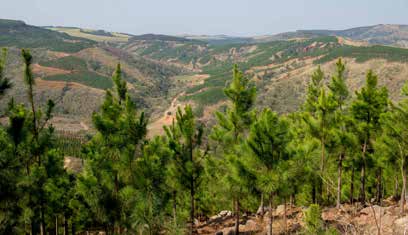 Agriculture and land reform
Agriculture and land reform
- 5 – the number of Agri-parks being constructed.
- 27 – the number of proposals received from commercial farmers.
- 4 – the number of proposals received from commercial farmers that are being implemented in the Eastern Cape and the Free State.
- 12 000 – the maximum hectares to be allowed for land ownership.
- 120 000 – the number of new land claims lodged by December 2015.
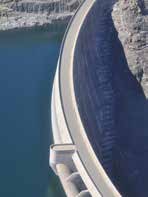 Water and sanitation
Water and sanitation
- 30 million - cubic meters of water to be provided per year by the Mokolo and Crocodile Water Augmentation project in Lephalale, Limpopo.
- 13 - the raised metres of the Clan William Dam wall in the Western Cape.
- 15 000 – number of young people being trained by the Department of Water and Sanitation to curb water wastage.
Highlights of the State of the Nation Address
Highlights of the State of the Nation Address Estelle Greeff
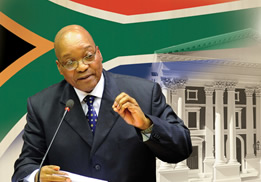 President Jacob Zuma delivered his State of the Nation Address (SoNA) to Parliament in Cape Town on Thursday, 11 February 2016. It was his third SoNA since he was re-elected to lead the fifth administration in May 2014. Among other things, the speech focused on the need to accelerate economic growth.
President Jacob Zuma delivered his State of the Nation Address (SoNA) to Parliament in Cape Town on Thursday, 11 February 2016. It was his third SoNA since he was re-elected to lead the fifth administration in May 2014. Among other things, the speech focused on the need to accelerate economic growth.
The President also provided an update on the Nine-Point Plan that he unveiled at the 2015 SoNA, which seeks to stimulate economic growth and create much-needed jobs.
Human rights
Human Rights Day on 21 March will this year be commemorated as the national day against racism. It will be used to lay the foundation for a long-term programme of building a non-racial society.
Growing the economy
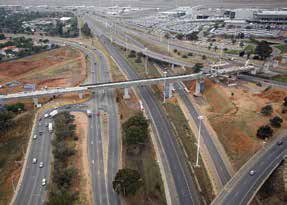 A resilient and fast-growing economy is at the heart of South Africa’s radical economic transformation agenda and the National Development Plan.
A resilient and fast-growing economy is at the heart of South Africa’s radical economic transformation agenda and the National Development Plan.
Government has embarked on an aggressive infrastructure development programme to stimulate growth. It has urged business and labour to continue marketing the country as a preferred destination for investments.
In order to create the correct investment support infrastructure, government is developing a One-Stop Shop/Invest SA initiative to signal that South Africa is truly open for business.
To ensure the success of this initiative, government will remove the red tape, and review any legislative and regulatory blockages.
Government has also established an Inter-Ministerial Committee on Investment Promotion to ensure the success of investment promotion initiatives.
Performance of state-owned companies
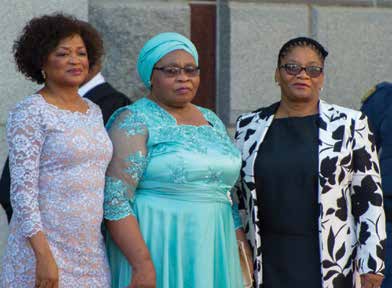 The South African National Roads Agency Limited has built some of the best roads in Gauteng and in many parts of the country.
The South African National Roads Agency Limited has built some of the best roads in Gauteng and in many parts of the country.
The Trans Caledon Tunnel Authority has constructed dams of varied capacities, which makes it possible for South Africans to have access to safe drinking water.
Transnet has built rail infrastructure which has enabled the country’s mines to move massive bulk of commodities through the ports to markets around the globe.
Development finance institutions such as the Industrial Development Corporation or Development Bank of Southern Africa and others continue to provide finance for infrastructure, various industries and agricultural businesses.
Government plans to implement the recommendations of the Presidential Review Commission on State-owned Enterprises, which outlines how the institutions should be managed in order to achieve the developmental objectives and aspirations of South Africa.
The President said:
“To achieve our objectives of creating jobs, reducing inequality and pushing back the frontiers of poverty we need faster growth. “In the National Development Plan, we set our aspirational target growth of five per cent per year, which we had hoped to achieve by 2019.”
Boosting tourism
South African Tourism will invest R100 million a year to promote domestic tourism and encourage South Africans to tour their country.
Migration
The draft migration policy, which will make it possible to import scarce skills into the country, will be presented to Cabinet during 2016.
Developing small businesses
Government, through the Department of Small Business Development, will provide access to high-quality, innovative business support that can dramatically improve the success rate of new ventures and empower small businesses to accelerate their growth.
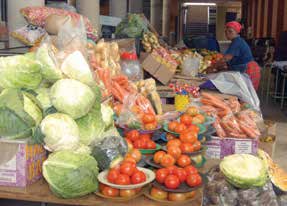 Economic transformation and black empowerment remain a key part of all economic programmes of government. Government has launched the Black Industrialists Scheme to promote the participation of black entrepreneurs in manufacturing.
Economic transformation and black empowerment remain a key part of all economic programmes of government. Government has launched the Black Industrialists Scheme to promote the participation of black entrepreneurs in manufacturing.
Government has urged big business to partner the new manufacturers, including businesses owned by women and the youth, as part of broadening the ownership and control of the economy.
Local banks – through the Banking Association of South Africa and in collaboration with the Ministry of Finance and National Treasury – will launch a project aimed at establishing a centre of excellence for financial services and leadership training.
This will help ensure that the country attracts, nurture, develop and retain the best talent in financial services in South Africa and across the continent. This will also provide job opportunities for many young people.
Cost-cutting measures
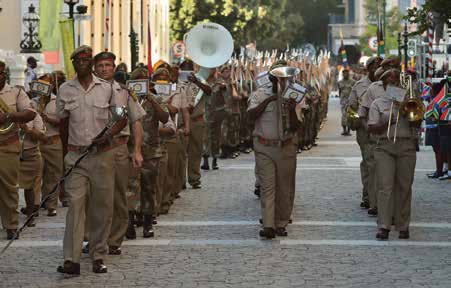 To cut wasteful expenditure without compromising on the core business of government and the provision of services to the people, government will implement the following austerity measures:
To cut wasteful expenditure without compromising on the core business of government and the provision of services to the people, government will implement the following austerity measures:
• Overseas trips will be restricted and those requesting permission will have to motivate strongly and prove the benefit to the country.
• The sizes of delegations will be greatly reduced and standardised.
• Further restrictions on conferences, catering, entertainment and social functions will be instituted.
• The Budget Vote dinners for stakeholders hosted by government departments in Parliament after the delivery of budget speeches will no longer take place.
A big expenditure item, that government would like to persuade Parliament to consider, is the maintenance of two capitals, Pretoria as the administrative one and Cape Town as the legislative capital.
“We cannot change the global economic conditions, but we can do a lot to change the local conditions.
“Let us work together to turn the situation around. It can be done.” – President Jacob Zuma
Higher Education
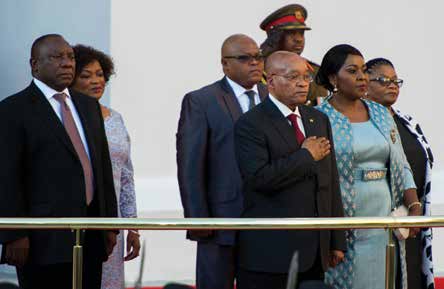 The Minister of Finance will provide details of the financial shortfall arising from the zero per cent university fee increase in his Budget Speech on 24 February 2016.
The Minister of Finance will provide details of the financial shortfall arising from the zero per cent university fee increase in his Budget Speech on 24 February 2016.
Government has appointed a Judicial Commission of Inquiry into higher education.
Health
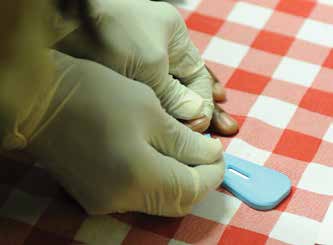 Life expectancy of South Africans for both males and females has significantly improved to 62 years, which is an increase of eight and a half years since 2005.
Life expectancy of South Africans for both males and females has significantly improved to 62 years, which is an increase of eight and a half years since 2005.
The HIV policy turnaround in 2009 led to a massive roll-out of HIV testing and treatment for 3.2 million people living with the virus. This has contributed immensely to healthier and longer lives for those infected.
Government, through the Ministry of Health, aims to revive prevention campaigns, especially amongst the youth.
The state-owned pharmaceutical company, Ketlaphela, has been established to supply antiretroviral drugs to the Department of Health from the 2016/17 financial year.
The White Paper on National Health Insurance (NHI) was released in December 2015 for public comments. NHI is aimed at achieving universal access to healthcare for all people in South Africa.
Local government issues
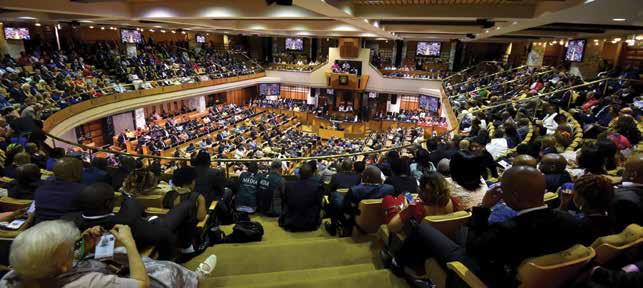 Local government elections will be held within three months after 18 May, the date of the last elections.
Local government elections will be held within three months after 18 May, the date of the last elections.
Government has urged all citizens over the age of 18, particularly the youth, to register to vote during the first registration weekend of 5 and 6 March 2016.
Government will intensify the implemention of the Back to Basics local government revitalisation plan in 2015, which was launched in September 2014.
More active monitoring and accountability measures to be used will include:
• unannounced municipal visits;
• spot checks of supply chain management processes;
• the implementation of recommendations of forensic reports;
• site visits of Municipal Infrastructure Grant funded projects; and
• increased interventions to assist struggling municipalities.
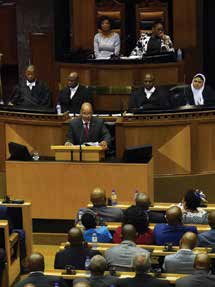 A 10-point plan of Back to Basics priority actions has been developed and it includes the promotion of community engagement.
A 10-point plan of Back to Basics priority actions has been developed and it includes the promotion of community engagement.
Safety and security
The South African Police Service is undergoing transformation and has adopted the Back-to-Basics approach to management to rebuild the organisation and improve performance at all underperforming police stations.
Government has condemned the killing of police officers and also urged police officers to defend themselves when attacked, within the confines of the law. To date, 57 police officers had been murdered during the 2015/16 financial year.
Strengthening relations in Africa and the world
South Africa continues to support peace and security and regional economic integration by participating in the African Union and the Southern African Development Community initiatives. It continued to assist sister countries such as Lesotho and South Sudan to resolve their issues.
The South African National Defence Force, which has been deployed in various peacekeeping missions on the continent, is showcasing its capability in Port Elizabeth from 13 to 21 February, as part of the celebration of the annual Armed Forces Day.
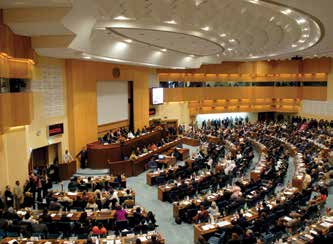 Brazil, Russia, India, China and South Africa (BRICS) have reached agreement on the New Development Bank or BRICS Bank, which is envisaged to approve its inaugural projects in April this year.
Brazil, Russia, India, China and South Africa (BRICS) have reached agreement on the New Development Bank or BRICS Bank, which is envisaged to approve its inaugural projects in April this year.
South Africa has participated in the India-Africa Summit held in New Delhi, India from 26 to 30 October 2015 and the Forum on China-Africa Cooperation hosted in Johannesburg from 4 to 5 December 2015.
As part of the US$50 billion worth of investments announced by China recently, South Africa will receive US$10 billion for infrastructure, industrialisation and skills development.
On North-South cooperation, South Africa continued its engagements with the European Union (EU), which is the country’s largest trading partner and foreign investor. Over 2 000 EU companies operating within South Africa have created over 350 000 jobs.
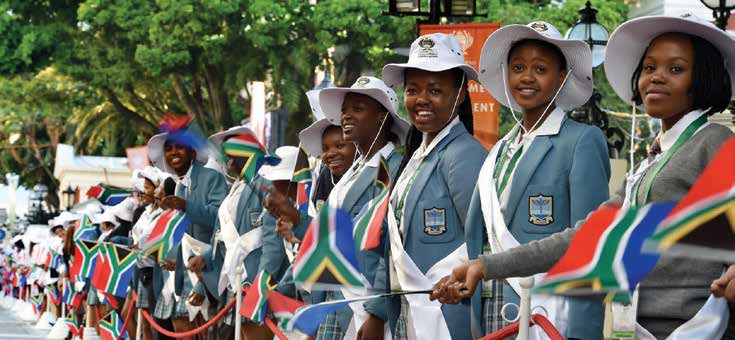 South Africa’s relations with the USA and Canada continue to strengthen, especially in the areas of economy, health, education, energy, water, safety and security, capacity building and the empowerment of women.
South Africa’s relations with the USA and Canada continue to strengthen, especially in the areas of economy, health, education, energy, water, safety and security, capacity building and the empowerment of women.
The renewal and expansion of the African Growth and Opportunity Act (AGOA) has provided a platform for the enhancement of industrialisation and regional integration. All outstanding issues around AGOA are being addressed.
Sporting programmes for a healthy lifestyle
 Government has urged all people in South Africa to participate in several programmes aimed at promoting healthy lifestyles and nation-building.
Government has urged all people in South Africa to participate in several programmes aimed at promoting healthy lifestyles and nation-building.
These include the National Recreation Day; Nelson Mandela Sports and Culture Day; World Move for Health Day; Golden Games, and Andrew Mlangeni Golf Development Day.
Promoting arts and culture
Government has established the Living Legends Committee to coordinate the participation of performing arts legends in nation-building activities in the country.
South African musicians and actors have heeded government’s call to unite and have since formed the Cultural and Creative Industries Federation of South Africa. The Presidency has established the Presidential Creative Industries Task Team to support the artists.
Update on the Nine-Point Plan
Update on the Nine-Point Plan Estelle GreeffState of the Nation Address
Resolving the energy challenge
 The fact that there has been no loadshedding since August 2015 shows that government has made progress in stabilising the electricity supply.
The fact that there has been no loadshedding since August 2015 shows that government has made progress in stabilising the electricity supply.
Government has invested R83 billion in Eskom to enable the power utility to support Medupi Power Station in Limpopo and Kusile Power Station in Mpumalanga, and also to continue with a maintenance programme. Additional units from Ingula Power Station, situated on the border of both the Free State and KwaZulu-Natal, will be connected in 2017.
The multiple-bid windows of the Renewable Independent Power Producer Programme have attracted an investment of R194 billion.
Government will this year select the preferred bidders for the coal independent power producer. A Request for Proposals will also be issued for the first windows of gas to power bids.
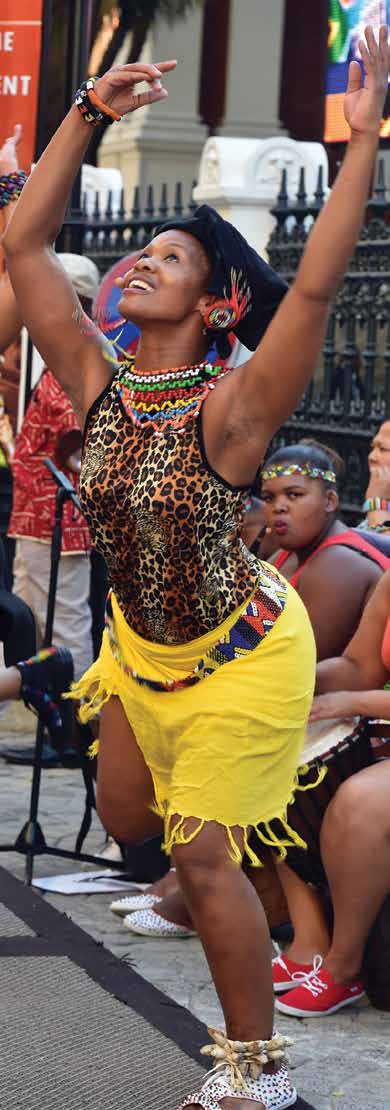 The nuclear energy expansion programme remains part of the future energy mix.
The nuclear energy expansion programme remains part of the future energy mix.
Government plans to introduce 9 600 megawatts of nuclear energy in the next decade, in addition to running the Koeberg Nuclear Power Station.
Incentives to boost investments
Government, through the Department of Trade and Industry, has introduced a number of incentives in the past few years to boost investments in the manufacturing sectors, especially the textiles, leather and automotive sectors.
The incentives for the automotive sector have attracted investments of over R25 billion over the last five years. They include key investments from Mercedes, General Motors, Ford, Beijing Auto Works, the Metair group, BMW, Goodyear and VW.
Multinational companies such as Nestle, Unilever, Samsung and Hisense have also affirmed South Africa as a regional manufacturing hub by retaining and expanding their investments in new plants.
Agriculture and land reform
Government has introduced the Agri-Parks Programme to increase the participation of smallholder farmers in agricultural activities.
Construction has begun in at least five Agri-parks in the West Rand in Gauteng, Springbokpan in North West, Witzenberg in the Western Cape, Ncora in the Eastern Cape and Ekangala in Mpumalanga.
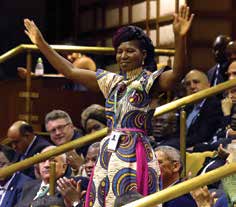 Ms Julia Shungube, the winner of the Female Entrepreneur of the Year 2015 Award from the Nkomazi Local Municipality in Mpumalanga.
Ms Julia Shungube, the winner of the Female Entrepreneur of the Year 2015 Award from the Nkomazi Local Municipality in Mpumalanga.
As part of the 50/50 Policy Framework that proposes relative rights for people who live and work on farms, 27 proposals have been received from commercial farmers and four are being implemented in the Eastern Cape and the Free State.
The Regulation of Land Holdings Bill will be presented to Cabinet in the first semester of 2016. The Bill aims to place a ceiling on land ownership at a maximum of 12 000 hectares and would prohibit foreign nationals from owning land. They would be eligible for long-term leases.
Since the reopening of land claims for people who had missed the 1998 deadline, about 120 000 new land claims had been lodged by December 2015.
Water and sanitation
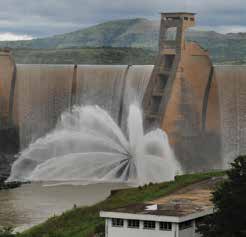 Government will continue to support farmers and communities affected by the drought, especially in the North West, KwaZulu-Natal, Free State, Limpopo and Mpumalanga. Among other things, it will provide mobile water tankers.
Government will continue to support farmers and communities affected by the drought, especially in the North West, KwaZulu-Natal, Free State, Limpopo and Mpumalanga. Among other things, it will provide mobile water tankers.
The first phase of the Mokolo and Crocodile Water Augmentation project in Lephalale area in Limpopo is fully operational. It will provide 30 million cubic meters of water per year.
The raising of the Clan William Dam wall in the Western Cape will raise the existing dam level by 13 metres to provide additional water supply.
The Department of Water and Sanitation is training 15 000 young people as artisans to fix leaking pipes and curb water wastage.
Improving labour relations
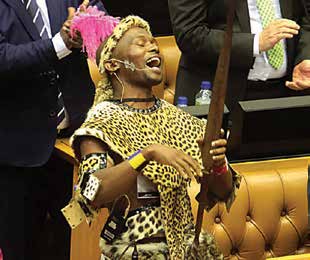 Government has welcomed the agreement reached by social partners at the National Economic Development and Labour Council (NEDLAC) on the principle of a national minimum wage.
Government has welcomed the agreement reached by social partners at the National Economic Development and Labour Council (NEDLAC) on the principle of a national minimum wage.
NEDLAC was also finalising a framework to stabilise the labour market by reducing the length of strikes and eliminating violence during strike action.
Government is in discussion with the Congress of South African Trade Unions to find a solution to contentious matters related to the Tax Laws Amendment Act, which was signed into law in December 2015.
Through the Department of Social Development and National Treasury, government is finalising the comprehensive social security policy.
Mining sector
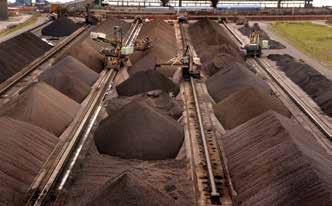 One of the positive developments in the mining sector was the Leaders’ Declaration to Save Jobs, which was signed by mining industry stakeholders in August 2015.
One of the positive developments in the mining sector was the Leaders’ Declaration to Save Jobs, which was signed by mining industry stakeholders in August 2015.
To curb job losses, government has appealed to business that retrenchments should not be the first resort when they face difficulties.
Operation Phakisa
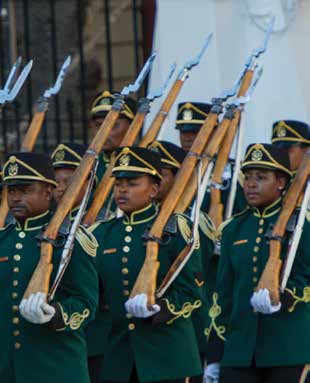 As part of Operation Phakisa – the fast-result methodology launched in 2014 and implemented in the ocean economy, health, education and mining sectors – R7 billion has been committed in new port facilities. This followed the adoption of a public-private partnership model for port infrastructure development by Transnet National Ports Authority.
As part of Operation Phakisa – the fast-result methodology launched in 2014 and implemented in the ocean economy, health, education and mining sectors – R7 billion has been committed in new port facilities. This followed the adoption of a public-private partnership model for port infrastructure development by Transnet National Ports Authority.
Through the oceans economy segment of Operation Phakisa, South Africa has registered two bulk-carrier vessels in Port Elizabeth and a third tanker in Cape Town.
The launch of a fuel storage facility in Cape Town has brought an investment of R660 million.
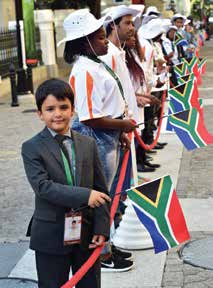 About R350 000 in private-sector investment has been committed in the aquaculture sector, which is an important growth area within the oceans economy segment of Operation Phakisa. Nine aquaculture farms are already in production in the Eastern Cape, KwaZulu-Natal, Western Cape and Northern Cape.
About R350 000 in private-sector investment has been committed in the aquaculture sector, which is an important growth area within the oceans economy segment of Operation Phakisa. Nine aquaculture farms are already in production in the Eastern Cape, KwaZulu-Natal, Western Cape and Northern Cape.
The Department of Science and Technology is expected to finalise the Sovereign Innovation Fund, a public-private funding partnership aimed at commercialising innovations based on ideas from the public and private sectors.
Broadband roll-out
Government has allocated R740 million to fast track the implementation of the first phase of broadband roll-out to connect more than 5 000 government facilities in eight district municipalities over a three year period.
Ministers react to SONA
Ministers react to SONA Estelle GreeffSome of the Ministers in government's Economic Cluster have said President Jacob Zuma’s frank assessment of the economy are a sign of decisive leadership.
The Ministers said this when reacting to the President’s State of the Nation Address shortly after the President had delivered his speech.
In his speech, President Zuma emphasised the importance of business partnerships with government - the recent agreements reached between government and CEOs of top companies during a high-level meeting in Cape Town – saying these partnerships were the key to unlocking the potential of the economy.
Finance Minister Pravin Gordhan
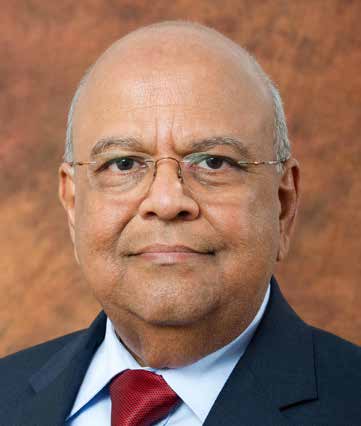 Minister Pravin Gordhan said the President had placed a lot of emphasis on government working together with all sectors of the economy.
Minister Pravin Gordhan said the President had placed a lot of emphasis on government working together with all sectors of the economy.
“The important signal is that over the past few weeks, before Davos and after Davos, we are making every effort to partner with the business sector, to get an understanding with trade unions as well, and basically send a message to all of South Africa that we are in this together - it is not just government’s job to save the ratings.
“If you want to improve the investment climate, all of us need to talk positively about South Africa and work as one team. I think the President gave important leadership today,” he said.
The President also announced austerity measures in the public sector and added that there was a need to curb spending in non-essential areas like entertainment. These measures are aimed at managing overspending and preventing wastage.
Trade and Industry Minister Rob Davies
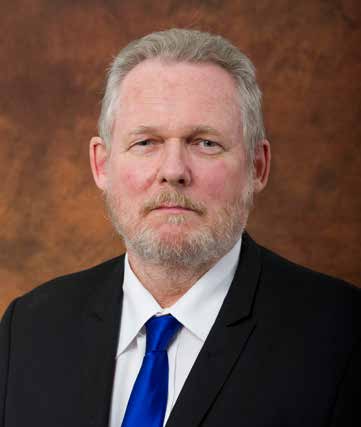 Minister Rob Davies said: “I think the President painted the picture of the headwinds that we are going to face. He also said we have to build on the things we can fix and can influence.
Minister Rob Davies said: “I think the President painted the picture of the headwinds that we are going to face. He also said we have to build on the things we can fix and can influence.
“So first of all, I think it was a fairly substantial programme of cuts, frills and wasteful expenditure that was announced that will be elaborated on in the budget.”
The Minister said progress has been made with regards to the Nine-Point Plan which was announced last year.
“And then on the other hand, I think in the Nine-Point Plan, there was progress; progress in some of the value-added activities, progress in mineral beneficiation … and progress in the agriculture and processing value chain.
President Jacob Zuma announced the Nine-Point Plan during his 2015 State of the Nation Address to boost economic growth and create much-needed jobs.
“This all has to be built on and we have to take our people along with us and make sure that we prioritise things that will create jobs, things that will support empowerment because empowerment and bringing about a more inclusive economy is the most critical part of the picture.
“He covered all the basics that are required. I think it is up to us to implement and it will be elaborated on further in the weeks ahead,” the Minister said.
Small Business Development Minister Lindiwe Zulu
Minister Lindiwe Zulu said government has for years worked hard to achieve radical economic transformation in a bid to empower the previously disadvantaged black majority.
She said government hoped that the meeting with big business would bear some fruit and that the private sector would prioritise empowerment.
"What is important is that we are prepared to engage because as you saw before Davos, government had a meeting with big business... and just before the State of the Nation Address, the President again called for a meeting and thank God it was big businesses around the table. Hopefully, we will be able to address the issues."
Government establishes pharmaceutical company
Government establishes pharmaceutical company Estelle GreeffGovernment has established a state-owned pharmaceutical company that will supply antiretroviral drugs to the Department of Health, President Jacob Zuma has announced.
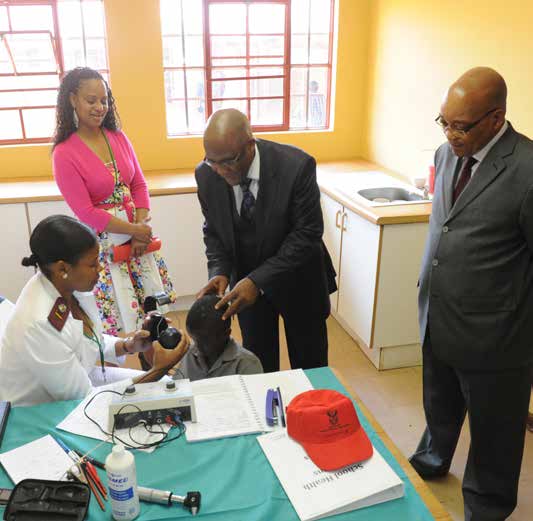 “I am happy to announce that the state-owned pharmaceutical company, Ketlaphela, has been established. The company will participate in the supply of anti-retroviral drugs to the Department of Health from the 2016/17 financial year,” said President Zuma.
“I am happy to announce that the state-owned pharmaceutical company, Ketlaphela, has been established. The company will participate in the supply of anti-retroviral drugs to the Department of Health from the 2016/17 financial year,” said President Zuma.
President Zuma said the country’s HIV policy turnaround in 2009 has led to a massive rollout of HIV testing and treatment for 3.2 million people living with the virus.
“This has contributed immensely to healthier and longer lives for those infected. We acknowledge the contribution of partners in the South African National Aids Council [SANAC] which is chaired by the Deputy President [Cyril Ramaphosa],” said President Zuma.
SANAC is a voluntary association of institutions established by Cabinet to build consensus across government, civil society and all other stakeholders to drive an enhanced country response to the scourges of HIV, TB and sexually tarnsmitted infections.
The next step, said President Zuma, is the revival of prevention campaigns, especially amongst the youth. Health Minister Dr Aaron Motsoaledi will soon announce a “major campaign in this regard”, he said.
President Zuma said life expectancy for both male and female South Africans has improved significantly at 62 years across the genders. This is an increase of eight and a half years since 2005.
Meanwhile, the White Paper on National Health Insurance (NHI) was released in December 2015. It is aimed at improving health care for everyone in South Africa. At the time, Minister Motsoaledi said the effective implementation of the NHI was key to improving service delivery in the health sector in South Africa.
The NHI, a health financing system that is designed to pool funds to provide access to quality, affordable health care, is part of government’s major health sector reforms and is being rolled out over a 14-year period.
Growing the economy, creating jobs
Growing the economy, creating jobs lebangTrade and Industry Minister Rob Davies says incentives offered by the department has led to government retaining 68 000 jobs in the clothing and textile sector.
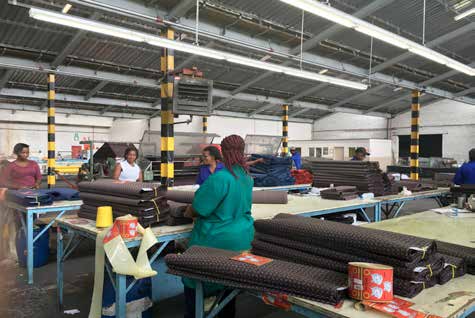 This means that many factory workers who make clothes and shoes, amongst other products, are able to provide for their families despite tough economic times.
This means that many factory workers who make clothes and shoes, amongst other products, are able to provide for their families despite tough economic times.
Minister Davies said this when he delivered a speech during a debate on President Jacob Zuma’s State of the Nation Address.
“The clothing and textiles sector was in terminal decline but we took steps based on the Clothing and Textile Competitiveness Improvement Programme and between 2010 and March 2015 we supported R3.7 billion worth of competitiveness rising initiatives in the sector.
“As a result 68 000 jobs in this sector have been retained and 6 900 new jobs have been created,” he said.
The Minister also said that 22 new factories in the leather and footwear sector have been opened. He said the clothing and textile sector has been successfully stabilised and is steadily regaining its domestic market share and beginning to grow exports.
“A sign of this is that retailers such as Foschini have been happy to invest in productive clothing companies in this country because they realise that there is value to be had,” he said.
Government wants to create 100 black industrialists
Minister Davies says the recently launched Black Industrialist Programme has already received pledges in excess of R30 billion from Development Finance Institutions (DFIs).
Minister Davies launched the forum, set up to oversee the applications for the black industrialist programme, in December.
The Black Industrialist Programme
“I am happy to indicate that we already have pledges of over R30 billion from institutions like the Land Bank, the Industrial Development Corporation (IDC), the Small Enterprise Finance Agency (Sefa), the Development Bank of Southern Africa (DBSA) and some provincial organisations like the KwaZulu-Natal Growth Fund.
“We have already received applications and I am pleased to say that the funding forum will hold its first meeting next month,” he said.
During his State of the Nation Address, President Zuma said economic transformation and black empowerment remain a key part of all economic programmes of government.
He said one of government’s new interventions is the black industrialist scheme which has been launched to promote the participation of black entrepreneurs in manufacturing.
The President urged big business to partner with the new manufacturers, including businesses owned by women and the youth, as part of broadening the ownership and control of the economy.
During the debate, Minister Davies said during the course of this year, government will be introducing a new Industrial Policy Action Plan (IPAP), which will cover the actions of this year.
“One of the new features is that we will be introducing gas industrialisation, but will also be focusing on labour intensive sectors taking forward to work on the clothing and textile sector and agro-processing, [amongst others].
“The higher level of localisation has been achieved. We now have firms, that would have supplied us with imports coming into South Africa, investing and producing here.
“But we are not at a point in localisation where we have sufficient local companies, particularly companies that are owned by the majority of this country’s population, that are driving jobs.
“It is for this reason that we have launched a targeted black industrialist programme,” he said.
Improving lives of all South Africans
Improving lives of all South Africans lebangEconomic Development Minister Ebrahim Patel says despite South Africa’s economy being faced with tough times, over 700 000 jobs have been created over the past year.
The Minister said this when he made remarks during a debate on the State of the Nation Address in Parliament recently.
“Even with these headwinds and the real challenges we face, the past year has seen real concrete progress.
“The economy created 712 000 new jobs in 12 months, in tough, difficult conditions. “Most of the new jobs came from agriculture, the construction industry and business services,” the Minister said.
He said the province with the strongest employment creation over the 12 months was Gauteng, with 191 000 more jobs, followed by KwaZulu-Natal and Limpopo.
Minister Patel said employment for the year as a whole grew by 4.7 per cent, significantly outperforming the country’s economic growth.
The Minister said despite these positive figures, too many of our people remain unemployed.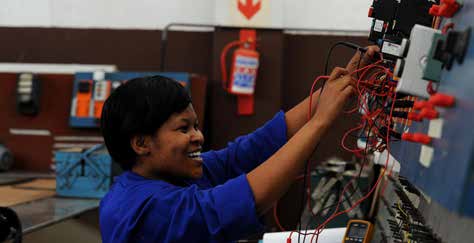
He said that last year, while the economy created almost three quarters of a million new jobs, the number of work-seekers grew by almost a million, increasing the ranks of eight million South Africans who are ready to work but are unemployed.
“This is our challenge. This is what we need to address as we upscale our efforts on economic growth and make it more inclusive.
“Yes, we made real progress on jobs and yes, we maintained growth last year when others have gone into recession. But we need to do even better,” he said.
The Minister said to do better, and to promote greater levels of inclusion, government:
Was completing measures to increase support for Small and Medium-sized Enterprises;
Plans to promote youth entrepreneurship and youth jobs through a regulation to require national infrastructure projects to employ up to 60 per cent of new staff from young professionals and young workers; and
Will set aside loan-funding of R4.5 billion for youth empowered businesses. He said that to support rural and agricultural inclusion, government has prepared a first package of support, just short of a billion rand, to farmers affected by the drought.
The Minister said government would act against corruption and collusion in the economy.
Minister Patel said, meanwhile, that government would step up its efforts with the private sector and with organised labour to create jobs, reduce fractious, conflictual relationships and build a deeper partnership.
This will be done with greater urgency, the Minister said, because the country is confronted with big challenges that can slow progress to its goals.
“We need to create more jobs through infrastructure, industrialisation, innovation, investment, inclusion and integration and work more effectively through the institution-building and implementation,” he said.
Government invests R1 billion a day to improve lives
The Minister said one of government’s aims is to create jobs through infrastructure and, to this end, R290 billion was invested over the past calendar year.
He said this amounted to more than R1 billion every working day.
This, the Minister said, enabled government to build 160 new schools and to provide new higher education housing accommodation for an additional 3 100 students.
With R1 billion a day, government was able to start construction on three new technical college campuses and two new universities.
Government also built about 100 000 new houses and connected 265 000 homes to electricity.
“The R1 billion a day enabled us to erect more than 300 kilometers of transmission lines to bring power closer to the people,” he said.
He said government also connected 1 700 Megawatts of energy to the grid, almost equal to a new Koeberg power station.
Ten renewable energy plants, generating clean, green energy were also completed due to the funding.
“We switched on one unit of the Medupi power station that brought more energy to the grid than the electricity use of residents of two big cities combined - Nelson Mandela Bay and Mangaung.
“The R1 billion a day helped us to improve or repair more than 24 000 kilometers of roads and start to develop a modern urban public transport system,” he said.
Government was also able to install solar water heaters, bringing the total to date to more than half a million units.
Approximately 100 kilometers of water pipelines that can convey billions of litres of water a week to communities and businesses were built, as well as 29 new medical clinics constructed and one new hospital opened.
“Behind these numbers are South Africans whose lives were improved.
“The R1 billion a day supported more than 200 000 workers now employed on the public infrastructure programme, as engineers, metal workers, plumbers, electricians, bricklayers, road-builders and construction workers.
“The investment helped millions of citizens in townships and suburbs to experience change in their lives,” he said.
Access to water and decent sanitation
Access to water and decent sanitation lebangAs government works hard to improve lives and restore the dignity of all South Africans, Water and Sanitation Minister Nomvula Mokonyane says the department has eradicated the bucket toilet system in five provinces.
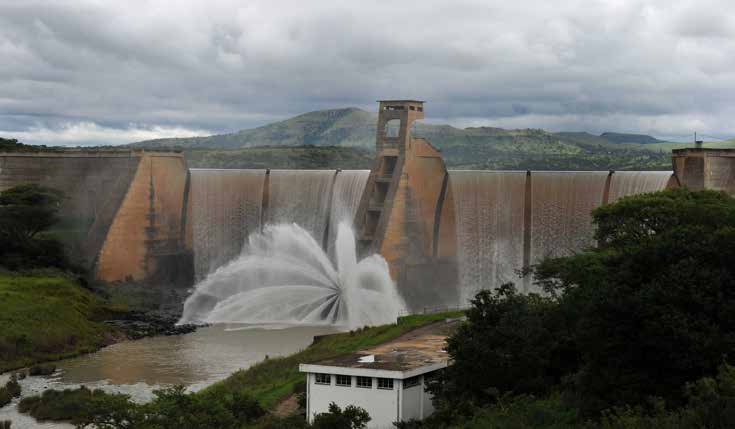 The Minister announced this in Parliament when she participated in a debate of the State of the Nation Address recently.
The Minister announced this in Parliament when she participated in a debate of the State of the Nation Address recently.
“We have eradicated all buckets in five provinces. We are currently working in the remaining four provinces.
“Those four provinces have about 18 000 buckets that still need to be eradicated with the majority in the Free State province,” she said.
The Minister said that by the end of the current financial year, the department was working towards eradicating all buckets in three of those provinces, including North West, Northern Cape and Eastern Cape.
She said that in the Free State, the department would have installed all top structures with only connection to bulk pipes remaining.
This would be due to the roll out of bulk infrastructure that is being installed, the Minister said.
Citizens commended for operation hydrate
During his State of the Nation Address, the President commended the civil society initiative, Operation Hydrate, and others for the provision of water relief to many communities that have been experiencing water shortages.
He added that the building of water infrastructure remains critical so that government can grow access to water to the people and to industry consumers.
“The first phase of the Mokolo and Crocodile Water Augmentation project in Lephalale in Limpopo is fully operational,” said President Zuma.
He said this would provide 30 million cubic meters of water per annum.
During the debate, the Minister said the various initiatives taken by civil society, South Africans from all walks of life, school children, private sector and community-based organisations, which came forward and distributed drinking water to areas that are severely affected by drought is inspiring.
“These include, amongst others, Operation Hydrate and Gift of the Givers, supported by the Nelson Mandela Foundation and Proudly South African. This is social cohesion and nation building in action, notwithstanding the adversity,” she said.
Approximately 16 million people have access to water at home.
The Minister said, meanwhile, that the subsidised government housing sector has now reached the milestone of having provided four million households with housing opportunities since 1994.
This includes fully subsidised stand-alone houses, serviced stands, community residential units, social and rental units.
“As recently as October 2015, we conducted a hand-over with President Zuma here in KwaLanga, Cape Town, of the N2 Gateway Integrated Housing Project.
“This project has delivered 14 000 homes to our people and we continue to count as we move towards the 20 000 target set by this government.
“Today, the people of Khayelitsha Sites C and B have access to a dignified sanitation solution as a pilot project of the national government,” she said.
The Minister said government would continue on this path of delivery as a sign of its commitment to changing the lives of the people and delivering a better life for all through-out the country, including in the Western Cape.
Quality education for all
Quality education for all lebangState of the Nation Address
The Department of Science and Technology says government is ensuring that over nine million school children do not go to class on an empty stomach.
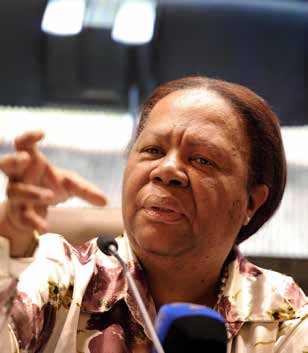 This is according to Department of Science and Technology Minister Naledi Pandor who said that government and the late former President Nelson Mandela laid a good foundation for the country to celebrate achieving of universal access to basic education for all girls and boys.
This is according to Department of Science and Technology Minister Naledi Pandor who said that government and the late former President Nelson Mandela laid a good foundation for the country to celebrate achieving of universal access to basic education for all girls and boys.
The minister was speaking during the debate on President Jacob Zuma’s State of the Nation Address in Parliament in Cape Town recently.
“The number of learners who benefit from the National School Nutrition Programme (NSNP) is 9.2 million out of a total of million learners in public schools.
“The number of learners who benefit from the No-fee school policy is 9.4 million out of 12.6 million learners in public schools,” the Minister said.
Education is government’s leading priority in its 12 outcomes framework, most of which are focussed on improving the lives of all South Africans.
During the debate, Minister Pandor said government has made headway through various programmes to ensure that learners receive quality education and that they are able to move through the system with exceptional results.
The Minister also said that there has been a dramatic increase in the number of learners writing and completing Grade 12, from 532 860 in 2014 to 644 306 in 2015.
“The 2015 numbers are the highest in the history of South Africa.
“One of the most encouraging outcomes of 2015 is the improvement in the quality of performance in Quintile 1 to 3 schools. This contributed greater numbers of bachelor passes and distinctions.
Tertiary education
During his State of the Nation Address, the President said government has responded to the financial shortfall arising from the zero per cent university fee increase, as agreed in a meeting with students and vice-chancellors last year.
After several student protest demanding a zero per cent fee increase through their #feesmustfall campaign, the President heeded their call following consultations with student leaders and university vice chancellors.
He also appointed a Judicial Commission of Inquiry into higher education, and urged all stakeholders to work with the Commission to ensure its success.
During the debate, Minister Pandor urged all students to focus on learning and parents who can afford to pay fees to do so.
“We condemn wanton destruction and violence on campuses and support Minister Nzimande in his efforts to ensure a successful academic year.”
Some of the results that government was pleased with include:
- The percentage of five-year-olds attending educational institutions at Grade R has increased to 87,2
- percent.
- Schools have a 100 per cent intake for Grade 1.
- The percentage of 14-18-year-olds attending educational institutions is at 90.7 per cent.
- The percentage of five year old children with disabilities attending educational institutions is at 83.9 percent.
- The percentage of seven to 15 -year-old children with disabilities attending educational institutions, is at 93.4 per cent.
Use electricity sparingly
Use electricity sparingly lebangState of the Nation Address
It’s been just over six months since the country has experienced load shedding. This has brought relief for both households and industry.
Energy Minister Tina Joemat-Pettersson said government’s interventions have ensured that the country’s lights are kept on.
The Minister, however, warned that in order to keep the lights on, the country cannot afford to be complacent and misuse electricity.
“We have to be honest and acknowledge that we have had challenges with electricity supply. However … it has been six months since we last had load shedding.
“This is the result of the interventions that we have made, as well as the positive response of South Africans to use electricity sparingly,” she said during a debate following President Jacob Zuma’s State of the Nation Address in Parliament recently.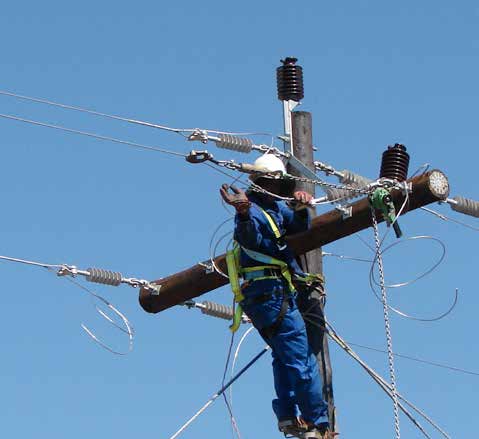
When the President delivered his State of the Nation Address at the National Assembly during a joint-sitting of houses, he gave an update on government’s Nine-Point Plan that was approved by cabinet to tackle challenges that hindered growth.
Electricity supply was one of the main challenges that were identified as a priority.
The President said government has invested R83 billion in Eskom, a move that has enabled the utility to continue investing in Medupi and Kusile, while continuing with a diligent maintenance programme.
Addressing Members of Parliament during the debate, Minister Joemat-Pettersson said South Africans must, despite the no load shedding milestone, ensure that they continue to use electricity responsibly.
“The situation remains tight and we must continue to use electricity carefully. Our communities are also demanding adequate service delivery, including the continuous supply of electricity.
“We see protests in our communities almost daily, but we have been listening to their concerns and demands.
“We have invested time and effort and we are now getting results,” he said.
How government is keeping the lights on
In his State of the Nation Address, President Zuma said additional units from Ingula power station will be connected in 2017, even though some of them will begin synchronisation this year.
He said that the multiple bid windows of the Renewable Independent Power Producer Programme have attracted an investment of R194 billion.
The President said the initiative is an example of how government can partner with the private sector to provide practical solutions to an immediate challenge that faces our country.
During the debate, the Minister said the Department of Energy was in the process of launching a gas to power procurement programme to generate in excess of 3 000 Megawatts of power.
Under the coal component of the energy mix the department will, in the next quarter ,, announce the preferred bidders for the first tranche of the allocated 2 500 Megawatts of the Independent Power Producer Programme.
The Minister said nuclear energy remains a central feature of the country’s energy mix. She said government planned to buy an additional 9 600 Megawatts of nuclear energy over the next 10 years.
“Constrained electricity supply has had a significant effect on the economy and the potential for new investment. We know that investors do not like uncertainty.
“We have been able to provide the certainty with our Independent Power Producer Programme,” the Minister said.
Empowering our youth
Empowering our youth lebangState of the Nation Address
The National Youth Development Agency (NYDA) has created over 11 000 jobs over the past three years through various initiatives.
 This is according to Deputy Minister in the Presidency Buti Manamela.
This is according to Deputy Minister in the Presidency Buti Manamela.
He said the NYDA had also provided 3 242 young men and women with grants of between R10 000 and R100 000 over the last three years during the current board’s tenure.
“As part of the NYDA’s partnerships with other government departments, the agency has supported young people to gain access to farming opportunities,” said Deputy Minister during the debate of President Jacob Zuma’s State of the Nation Address.
This includes assistance given to Neo Phayane, a member of the Ramatlabama Piggery Cooperative in a village in the North West just outside of Mafikeng. Together with his 11 peers, Phanyane started operating a pig production business from one of the member’s backyard.
“The co-op was assisted by the provincial Department of Agriculture and Rural Development and the NYDA to lease a farm to the total value of R 1 457 124.
“There are challenges and setbacks but there are pockets of excellence throughout the country which illustrates that, as you are preoccupied with changing the ruling party, we are more focused on changing the lives of the majority of our people,” he said.
The Deputy Minister said, meanwhile, that since the launch of the Solomon Mahlangu Scholarship Programme by the President in 2014, more than 500 young people have received scholarships.
“One of them, Anele Pike, is studying LLB at the University of the Western Cape and she matriculated from Outeniqua High School in George.
Keeping communities safe
The Deputy Minister has called on communities to be active in the fight against crime.
“The National Development Plan calls for the promotion and encouragement of an active citizenry.
“In this regard we have prioritised the establishment of Community Safety Forums (CSFs) to serve as platforms for the coordination, integration and monitoring of implementation of multi-sectorial crime prevention- and community safety initiatives,” he said during the debate of President Jacob Zuma’s State of the Nation Address.
According to latest police statistics, over the last ten years, government has been able to reduce reported contact crime by about 18 percent from 750 440 in 2005/6 to 616 973 in 2014/15.
In the same period, murders and attempted murders declined by three per cent and 18 percent respectively. Similarly sexual offences (inclusive of rape and attempted rape) as well as assault with the intent to cause grievous bodily harm have evinced a reduction in the levels by 20 percent and 19 percent correspondingly.
The Deputy Minister said the country is currently faced with an unacceptable levels of serious and violent crime.
“Criminal conduct such as the destruction of private and public property cannot be tolerated and must be dealt with harshly by our law enforcement agencies.
“In this regard government has prioritised the enhancement of the capacity and competencies of the Public Order Policing Unit of the SAPS, ensuring that areas afflicted by protests accompanied by violence are stabilised.
“In addition our focus is on increasing the rate of detection of these crimes as we as to prosecute the perpetrators thereof,” he said.
National Day against racism
During his State of the Nation Address, President Zuma emphasised the need to fight the scourge of racism. He said this year’s Human Rights Day will be used to commemorate a national day against racism.
The Deputy Minister said racism has taken the form of economic exploitation, social exclusion and continues to divide millions of South Africans.
“It is important that we mobilise all South Africans in this important fight,” he said.
SoNA Pictorials
SoNA Pictorials Joy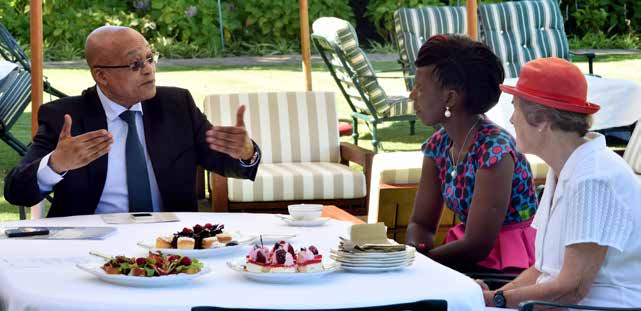
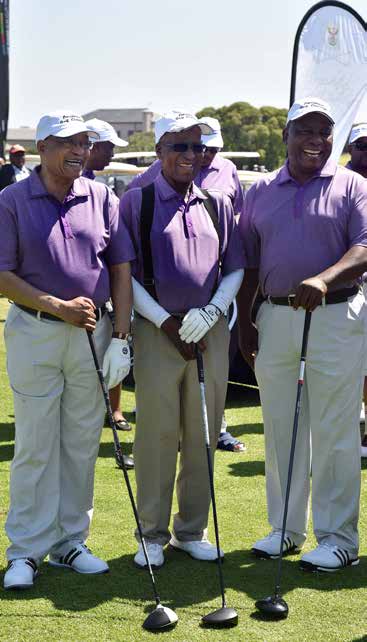
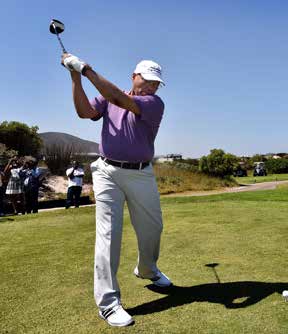
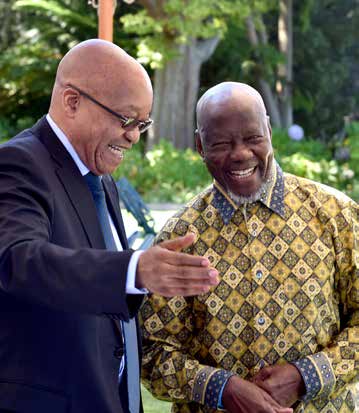
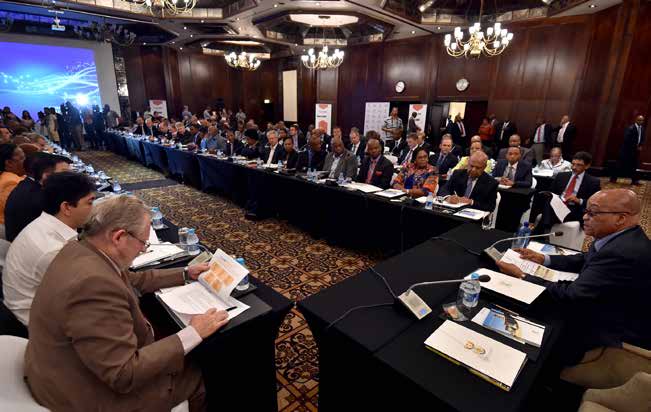
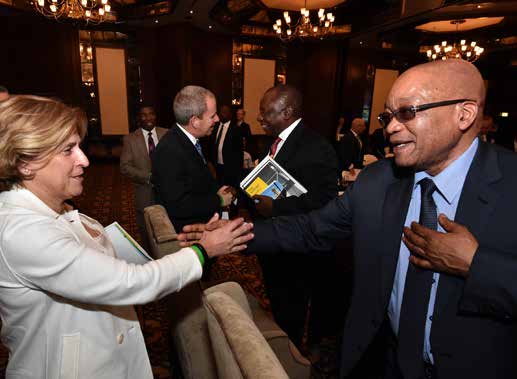
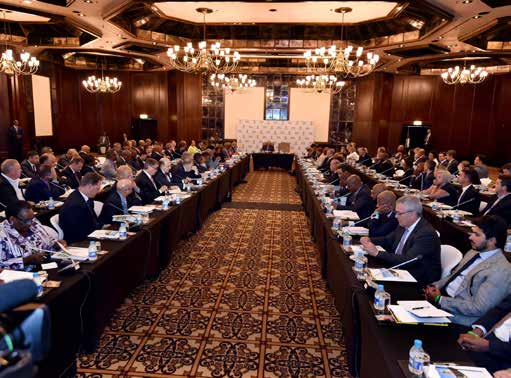
What South Africans had to say about SoNA 2016
What South Africans had to say about SoNA 2016 JoyThousands of South Africans listened to and watched President Jacob Zuma deliver his State of the Nation Address on 11 February. Here are some of their views:
 NAME:
NAME:
Nobuhle Filtane
OCCUPATION:
Grade 11 Learner
PROVINCE:
Eastern Cape
What did you think of the speech? I like the fact that the President is paying attention to the higher education challenges, in particular the free education matter and the drugs issue in South Africa.
The President also touched on the matter of the drought and how government is dealing with it. I also liked the fact that he gave an update on the Nine-Point plan.
 NAME:
NAME:
Teniel Sharpley
OCCUPATION:
High school learner
PROVINCE:
Eastern Cape
What did you think of the speech? The speech was great, where we felt like losing hope we saw that there are plans in place to fix those challenges, especially issues of unemployment, investment in our country, improving rural development especially support to local cooperatives/small enterprises.
 NAME:
NAME:
Kamohelo Tsotetsi
OCCUPATION:
Community Member
PROVINCE:
Gauteng
What did you think of the speech? I am happy that the President raised the issue of racism and that Human Rights Day will be commemorated as the Day of Racism.
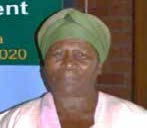 NAME:
NAME:
Elena Sibaya
OCCUPATION:
Pensioner
PROVINCE:
KwaZulu-Natal
What did you think of the speech? The president gave a great speech. He was talking about various things that affect all South Africans, not just Black, White or Indian, but every citizen.
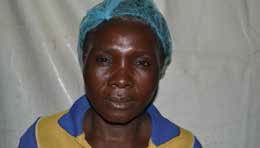 NAME:
NAME:
Maria Mathebula
OCCUPATION:
Production worker
PROVINCE:
Limpopo
What did you think of the speech? I thought the speech was good. I was hoping that the President would talk about the ABET programme targeting farm workers, because it is only made available in townships and villages.
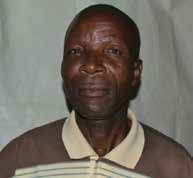 NAME:
NAME:
Derrick Mkansi
OCCUPATION:
Chairperson of SANCO in Tzaneen Sub-region
PROVINCE:
Limpopo
What did you think about the speech? The speech is a clear demonstration of a government that is in touch with the hardships of the people of the ground. Government is committing to cut spending on nonessentials in order to save money for service delivery programmes. The proposal on the relocation of parliament from Cape Town must be welcomed. Government is encouraging our people to go back to farming for food security, but there is little information on assistance for black commercial farmers.
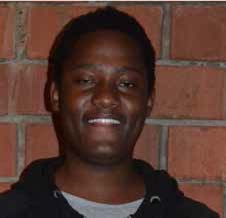 NAME:
NAME:
Andile Khoza
OCCUPATION:
Grade 11 learner
PROVINCE:
KwaZulu-Natal
What did you think of the speech? I think the speech covered most areas of importance, such as the state of the economy and education. I particularly liked that they will set aside a day to fight against racism which has been a big talking point in the country lately. As a young person I am pleased with the interventions he has made to address the issue of higher education funding. I hope he intensifies efforts towards attaining the goal of free education for all South Africans.
 NAME:
NAME:
Karabo Mothlabane
OCCUPATION:
Grade 11 Learner
PROVINCE:
Eastern Cape
What did you think of the speech? I likes that the President spoke about government’s plans to fight crime and improve the police service. He also talked about health issues and energy issue and drought.
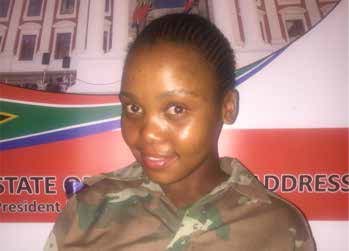 NAME:
NAME:
Hlengiwe Nhlapho
OCCUPATION:
Recruit at the South African National Defence Force
PROVINCE:
Northern Cape
What did you think of the speech? What I liked the most about the speech was the funding of SMMEs, because I’ve worked for one before and
I’ve seen the struggles, where more empowered and financial assistance is needed.
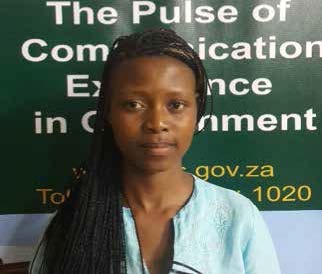 NAME:
NAME:
Slindile Nkosi
PROVINCE:
KwaZulu-Natal
What did you think of the speech? We appreciate the speech by the President. I am especially happy to hear that there will be an increase in funding for electricity infrastructure. This is good news for me because we don't have electricity in our area.
